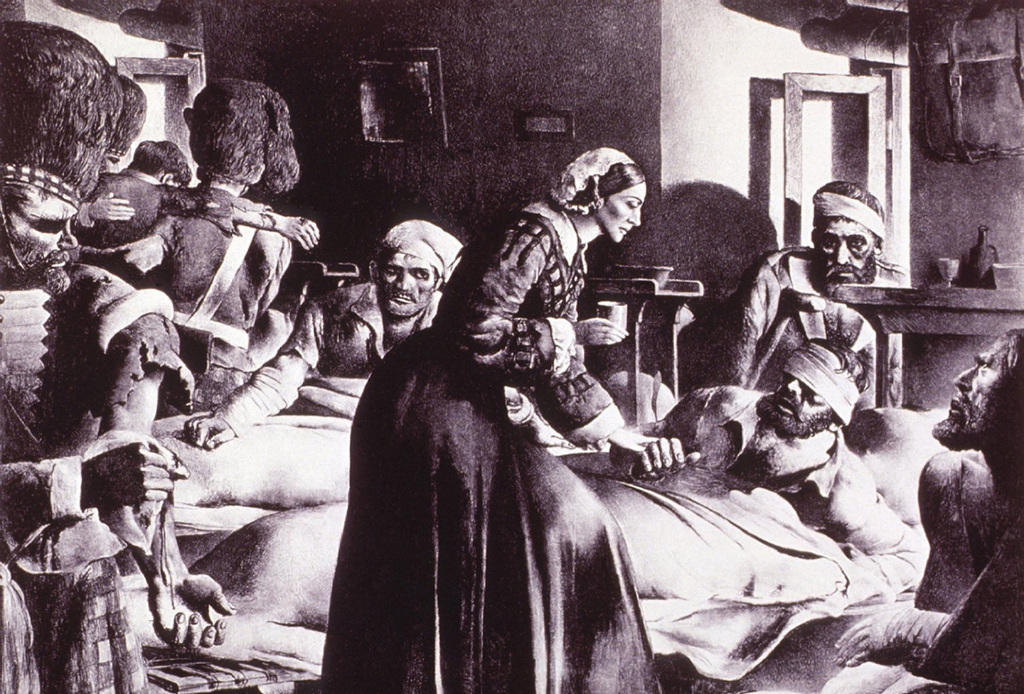Florence Nightingale

Credit: Canva
Licence: The Everett Collection
| Giver: | Individual |
|---|---|
| Receiver: | - |
| Gift: | - |
| Approach: | Philanthropy |
| Issues: | 10. Reduced Inequalities, 16. Peace, Justice and Strong Institutions, 3. Good Health and Well-Being |
| Included in: | Generosity and Health |
Florence Nightingale (1820-1910) was a British nurse, statistician and social reformer whose work was guided by her belief in health care as a basic human right. A transformational figure of the Victorian era, Nightingale defied social expectations for a woman of her privileged background, devoting her life to the care of people experiencing illness and material poverty. Widely recognized as the founder of modern nursing, Nightingale established enduring standards for a profession that demands not only rigorous attention to medical procedure but also unwavering compassion and generosity of spirit.
Nightingale was born in Florence, Italy, and grew up in rural England. Raised in a wealthy family with progressive ideas about girls’ education, Nightingale received private tutoring in philosophy, history, classical literature and mathematics. Her decision to become a nurse was inspired by a spiritual calling, received at the age of sixteen. After training at the Institute of Protestant Deaconesses in Kaiserwerth, Germany, she began her career as superintendent of a hospital for “gentlewomen” on Harley Street in London.
Personifying Compassionate Care
Nightingale remains most famous for her work caring for sick and wounded British soldiers during the Crimean War (1854-56). At the British Army base hospitals at Scutari, Turkey – where patients were more likely to die from dysentery, cholera, and other infectious diseases than from battle injuries – Nightingale fought to improve sanitary conditions and to procure adequate food and medical supplies. Staunchly committed to the humanity of every patient, she insisted they be kept clean, comfortable, warm and well fed, regardless of their medical prognosis. Faithfully touring the Barracks Hospital ward alone at night, monitoring her patients by the light of her fanoos (a Turkish lantern), she became legendary as “the lady with the lamp.”
Nightingale refused to accept any compensation or reward for her wartime service. In 1855, a British committee inaugurated a public subscription in her name, inviting grateful citizens from all walks of life to contribute to an endowment for the training of future nurses. A notice announcing the subscription acknowledged that Nightingale would certainly esteem even “a widow’s mite” (the smallest contribution) equally with larger sums from wealthy donors. The Nightingale Fund was formally established in 1857; by 1859 it was valued at GBP 45,000 (roughly equivalent to GBP 2 million today).
Elevating the Nursing Profession
In 1860, Nightingale used the fund to establish the Nightingale Training School for Nurses at St Thomas’ Hospital in London. The first secular nursing school of its kind, it elevated the reputation of nursing as a career and catalyzed the proliferation of similar schools around the world.
Having contracted “Crimean fever” during the war, from which she never fully recovered, Nightingale lived mostly in seclusion and in poor health for the rest of her life. Still, she continued to advocate for improvements in hospital administration, patient care and other reforms, often using statistical evidence to make her case. In 1907 Nightingale became the first woman to receive the Order of Merit, Britain’s highest civilian honor.
More than a century after Nightingale’s death, her legacy continues. In 2023 the Nightingale Fund merged with the Florence Nightingale Foundation (established in 1934), becoming a single charity that supports training and leadership development for UK nurses and midwives.
Contributor: Erin Brown
| Source type | Full citation | Link (DOI or URL) |
|---|---|---|
| Publication |
Bostridge, Mark. “Florence Nightingale: The Lady with the Lamp.” BBC, February 17, 2011. https://www.bbc.co.uk/history/british/victorians/nightingale_01.shtml. |
https://www.bbc.co.uk/history/british/victorians/nightingale_01.shtml |
| Publication |
Bradshaw, Ann. “The Virtue of Nursing: The Covenant of Care.” Journal of Medical Ethics 25, no. 6 (December 1999): 477–81. http://www.jstor.org/stable/27718400. |
http://www.jstor.org/stable/27718400 |
| Publication |
McDonald, Lynn. “Florence Nightingale A Hundred Years On: Who She Was and What She Was Not.” Women’s History Review 19, no. 5 (2010): 721-40. https://doi.org/10.1080/09612025.2010.509934. |
https://doi.org/10.1080/09612025.2010.509934 |
| Website |
Nightingale, Florence. Florence Nightingale to Her Nurses, edited by Rosalind Nash Nightingale. London: Macmillan: 1914. https://www.gutenberg.org/cache/epub/49732/pg49732-images.html. |
https://www.gutenberg.org/cache/epub/49732/pg49732-images.html |
| Publication |
Gill, Christopher J. and Gillian C. Gill. “Nightingale in Scutari: Her Legacy Reexamined.” Clinical Infectious Diseases 40, Issue 12 (June 2005): 1799–1805. https://doi.org/10.1086/430380. |
https://doi.org/10.1086/430380 |